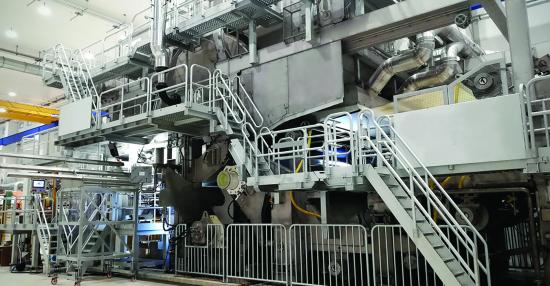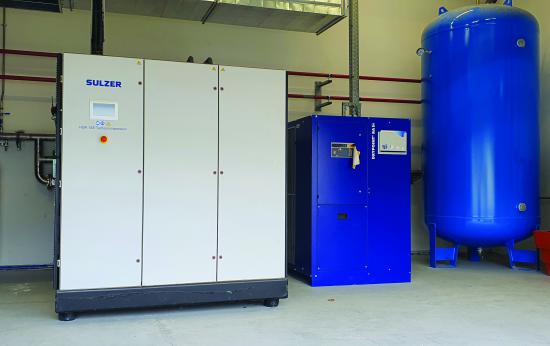The pulp and paper industry depends on reliable sources of energy, water and compressed air; maintaining cost-effective supplies of these utilities is important to every successful business. Within paper making processes, a clean, oil-free air supply is essential for the reliable operation of pneumatic equipment and a high-quality end product. For one manufacturer in Italy, the selection of an oil-free turbocompressor enabled both operational and maintenance costs to be reduced.
Paper manufacturing is, like all industries, affected by rising energy costs and raw materials. Individual manufacturers are looking to expand production, not only to keep up with rising demand, but also to benefit from economies of scale. Any project that can optimize energy costs and reduce maintenance spending can improve the competitive edge of a company.

Air Compressor Choices
The compressed air system is one area where significant improvements can be made. It is vital to a wide range of pneumatic equipment used throughout the paper making process, so reliability and efficiency are key. Yet, despite the air compressor being at the heart of this system, it is often over-looked when a plant or new production line is being designed. This can lead to opportunities to save energy being missed.
Typically, mill owners have a choice of three designs of air compressor: oil-injected screw compressor, an oil-free screw compressor or a turbo compressor. For any system that uses oil for lubrication, it is essential to have an oil separator adjacent to the air compressor to ensure any trace of oil is removed before the air is made available to the manufacturing equipment and tools.
Oil separation equipment needs to be properly maintained and any problems with performance can result in contamination of the compressed air supply. One way to avoid this scenario is to opt for a 100% oil-free air compressor, which means no oil is used anywhere in the operation of the equipment, including any gearboxes.
Annual Maintenance Costs
In the paper industry, energy costs are a major factor and gaining a few efficiency percentage points with the choice of air compressor will improve the overall energy bill. However, the area that will have the most significant impact in terms of annual costs is maintenance and servicing.
Traditional designs of air compressors suffer from increased levels of wear over the years, and with five-figure bills commonly attributed to annual maintenance, a performance review of the compressed air system could yield significant savings. For example, Sulzer’s development of the HSR oil-free turbocompressor product line uses active magnetic bearing technology, eliminating any lubricated bearings or seals and offers a near maintenance-free machine.
This also provides a 100% oil-free air supply, preventing the potential for contamination and helping to ensure high-quality products are delivered to customers.

The Sulzer HSR oil-free turbocompressor installation supports the new tissue line of Cartiera Confalone S.p.A. in Italy.
Proven Technology
The turbocompressor uses high-speed rotor technology proven with over two decades of operation in challenging industrial environments and magnetic bearing technology which means there is never any contact between static and rotating parts, even during starts and stops. As a result, there is no mechanical wear, no performance degradation over time and an absolute minimal requirement for scheduled maintenance.
Such attributes are now keenly sought by several industries, especially manufacturing, automotive, textiles, medical as well as the food and beverage sector. The low-pressure, high-volume turbo blowers that use the same technology have been supporting the wastewater industry and saving considerable costs for energy and maintenance for many years.
In addition, modern air compressor designs now allow waste heat to be recovered (up to 93% of the total power consumption) and used elsewhere in the plant, which can reduce expenditure on water heating. These two compelling arguments led the owner of an Italian paper mill to select Sulzer’s HSR air compressor for two separate sites.
Round-the-Clock Production at Cartiera Confalone
Cartiera Confalone S.p.A. had commissioned a brand-new, high-quality tissue paper line but the installation did not include an air compressor as part of the turnkey package. At the same time, the company wanted to replace the existing air compressor on the converting line. With so much pneumatic equipment on the lines, it was essential to find the best solution that would be capable of operating round-the-clock to match the production schedules.
However, in the past, the company had experienced significant maintenance issues with their air compressors and the oil separator equipment. For a business that is renowned for high-quality products, the risk of any oil contamination needed to be avoided. Furthermore, the annual running costs of the air compressor equipment were a concern going forward.
Sulzer’s agent in Italy, Adrien Frediani, explains: “When Mr. Confalone spoke to us about new air compressors, he was certain that he wanted 100% oil-free technology, as well as improved reliability. The additional benefits of much lower maintenance costs and the heat recovery system certainly played in Sulzer’s favor.”
Flexible Operation
Having researched the benefits of the turbocompressor, the customer invited Sulzer to assess each potential installation and develop a best air compressor specification for the production lines. Generally, the tissue line is operating round-the-clock, seven days a week, whereas the converting line has to alter its working hours to reflect demand. The flexibility of the turbocompressor means that both routines can be achieved with equal levels of efficiency and reliability.
The turbocompressor was specified to be capable of delivering the normal air consumption of the production line, allowing a legacy compressor to be held as a backup. It is expected to run continuously while the manufacturing line is operating, making reliability and efficiency high priority features.
The converting line was the first to be equipped with a 3-stage turbocompressor that delivered 8-9 bar pressure. The unit was fitted with intercoolers and an aftercooler, which optimize the pressurization process as well as capturing heat energy that can be used elsewhere in the factory.
Responsive Performance
The turbocompressor supplies an air storage vessel which acts as a buffer to ensure a consistent pressurized air supply. This is important to cater for larger pieces of equipment as they start and stop operations, allowing all other machinery to continue at the same time.
The first HSR turbocompressor was in operation for several months before the new tissue line was constructed. In that time the production team on the converting line found the compressor to work immaculately. Moreover, it was able to respond to increased demand much quicker than the legacy unit and this enabled the line pressure to be reduced from 9 bar (130 psi) to 7 bar (101 psi).
Since installation, the compressor has completed over six months in service and there have been no issues or maintenance costs. In fact, the negligible requirements for maintenance will have a significant impact on the annual budget with an expected reduction of around 75% for servicing.
Ongoing Savings
The most significant saving has come from the heat energy that has been recovered from the turbocompressor cooling system. The hot water has been used to heat all the water required in the washrooms of the converter plant, effectively making the gas boiler redundant. This alone will result in a EUR 10,000 (Euro) savings over 12 months.
In the meantime, the second turbocompressor unit was installed on the new tissue line. Sulzer has remained in contact with the maintenance team at the paper mill to ensure on-going satisfaction with the compressor. The feedback has been very positive and production has been progressing well. The team was pleasantly surprised by the minimal time required to start the compressor and inquired about running the machine at idle for short periods. Sulzer was able to remotely make some minor modifications to the compressors control structure that optimized the operation of the machine for the application.
Fabio Confalone, plant manager, explains: “We need to produce the highest quality paper products for our customers and that means we must invest in the best equipment. A completely oil-free compressor was essential for both of our expansion projects and the HSR has proven to be a great success.”
Author Bio
Ilari Pakkala is an Area Sales Manager at Sulzer in Finland. He holds a Bachelor of Science degree in Engineering. Since 2010, he has been responsible for export sales of industrial process pump, mixer and compressor solutions among others to Italy. To contact email: ilari.pakkala@sulzer.com.
About Sulzer
Sulzer is a global leader in fluid engineering. We specialize in pumping, agitation, mixing, separation and application technologies for fluids of all types. Our customers benefit from our commitment to innovation, performance and quality and from our responsive network of 180 world-class production facilities and service centers across the globe. Sulzer has been headquartered in Winterthur, Switzerland, since 1834. In 2021, our 13’800 employees delivered revenues of CHF 3.2 billion. Our shares are traded on the SIX Swiss Exchange (SIX: SUN). www.sulzer.com.
To read similar Pulp & Paper Industry articles, visit https://www.airbestpractices.com/industries/paper.
For expert presentations, visit our Webinar Archive Section dedicated to Air Compressor Technology at https://www.airbestpractices.com/magazine/webinars.




